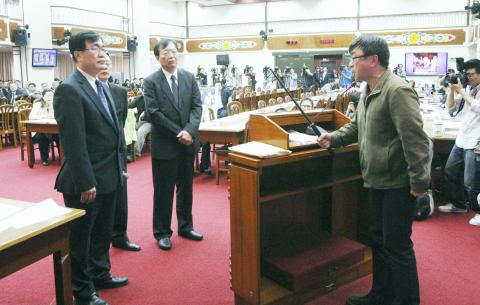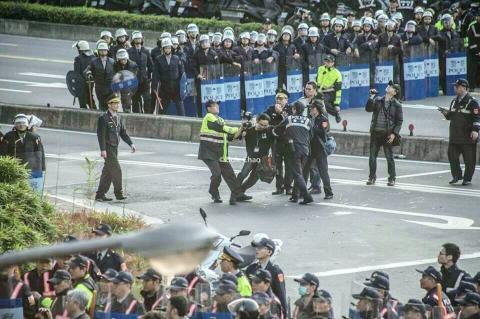Speaking about his experience of being evicted by police from the Executive Yuan in Taipei on Sunday, a student from Soochow University on Tuesday said he had “not expected the police to use such force.”
The student, surnamed Chen (陳), said he and some classmates had been sitting in protest against the cross-strait service trade agreement behind the Executive Yuan’s back gates, near Beiping East Road, when the police were about to start forcibly removing students from the premises.
“It was an area where there were fewer reporters present, and we were all driven away by the police,” Chen said, adding that the student who was in charge of the protest had specifically told them not to resist or cause any confrontation if the police acted against them.

Photo: Hsu Chai-chang, Taipei Times
“The student coordinator said: ‘Just sit tight, link your arms together and lie back,’” Chen said.
Chen said he was in the first row and was the second in the area to have been moved, adding that he had not expected to be hit with batons and kicked when he was “handled” by police.
“Even when I was curling up into a ball to protect myself, the police said I was not supposed to move,” Chen said.

Photo courtesy of Democratic Progressive Party Taipei City Councilor Chien Yu-yen
He added that officers told him to get up and start walking out, but when he complied they hit him on the back of the knee, causing him to fall forward.
They kicked him in the eyes, and he had lost his glasses in the process, he said, adding that he was diagnosed at the National Taiwan University Hospital with retinal edema, a slight concussion and bruising.
Although he knew he would be forcibly removed from the Executive Yuan, Chen said he had not expected such excessive use of force, adding that the experience made him angry at Premier Jiang Yi-huah (江宜樺) for saying that the police had removed the students in an amicable way.
“I never believed that Taiwan’s democracy would regress to how it was a decade ago, that is what saddens me the most,” Chen said.
Meanwhile, a student named Lo Wen-shao (羅文劭) said in a message posted on Facebook at 3am yesterday that the police rounded up the students on Sunday night after sending the media away, and hit everyone they could see.
“They did not even make a distinction between gender,” he said.
He said he was hit on the calf, adding that another officer had kicked him in the head and told him to get out.
“Have we killed, pillaged or committed arson? I do not understand how we, who were unarmed, nonresistant, and only wanting to defend the democratic system and our own future, warranted such treatment?” Lo wrote.

DAREDEVIL: Honnold said it had always been a dream of his to climb Taipei 101, while a Netflix producer said the skyscraper was ‘a real icon of this country’ US climber Alex Honnold yesterday took on Taiwan’s tallest building, becoming the first person to scale Taipei 101 without a rope, harness or safety net. Hundreds of spectators gathered at the base of the 101-story skyscraper to watch Honnold, 40, embark on his daredevil feat, which was also broadcast live on Netflix. Dressed in a red T-shirt and yellow custom-made climbing shoes, Honnold swiftly moved up the southeast face of the glass and steel building. At one point, he stepped onto a platform midway up to wave down at fans and onlookers who were taking photos. People watching from inside

MAKING WAVES: China’s maritime militia could become a nontraditional threat in war, clogging up shipping lanes to prevent US or Japanese intervention, a report said About 1,900 Chinese ships flying flags of convenience and fishing vessels that participated in China’s military exercises around Taiwan last month and in January last year have been listed for monitoring, Coast Guard Administration (CGA) Deputy Director-General Hsieh Ching-chin (謝慶欽) said yesterday. Following amendments to the Commercial Port Act (商港法) and the Law of Ships (船舶法) last month, the CGA can designate possible berthing areas or deny ports of call for vessels suspected of loitering around areas where undersea cables can be accessed, Oceans Affairs Council Minister Kuan Bi-ling (管碧玲) said. The list of suspected ships, originally 300, had risen to about

A Vietnamese migrant worker yesterday won NT$12 million (US$379,627) on a Lunar New Year scratch card in Kaohsiung as part of Taiwan Lottery Co’s (台灣彩券) “NT$12 Million Grand Fortune” (1200萬大吉利) game. The man was the first top-prize winner of the new game launched on Jan. 6 to mark the Lunar New Year. Three Vietnamese migrant workers visited a Taiwan Lottery shop on Xinyue Street in Kaohsiung’s Gangshan District (崗山), a store representative said. The player bought multiple tickets and, after winning nothing, held the final lottery ticket in one hand and rubbed the store’s statue of the Maitreya Buddha’s belly with the other,

Japan’s strategic alliance with the US would collapse if Tokyo were to turn away from a conflict in Taiwan, Japanese Prime Minister Sanae Takaichi said yesterday, but distanced herself from previous comments that suggested a possible military response in such an event. Takaichi expressed her latest views on a nationally broadcast TV program late on Monday, where an opposition party leader criticized her for igniting tensions with China with the earlier remarks. Ties between Japan and China have sunk to the worst level in years after Takaichi said in November that a hypothetical Chinese attack on Taiwan could bring about a Japanese